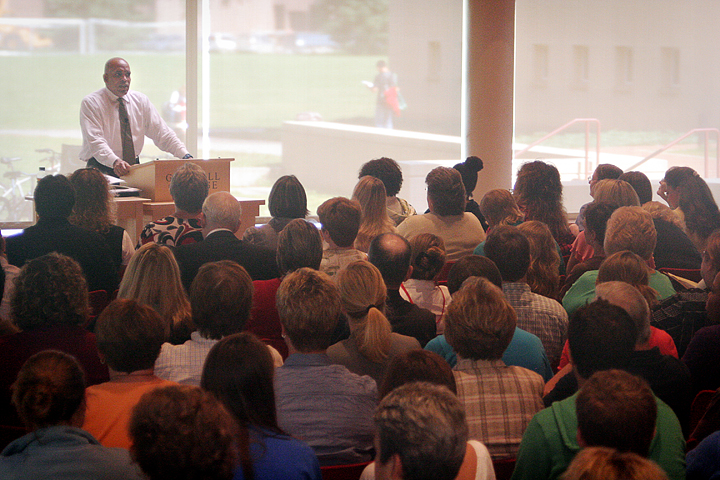On Sept. 20, President Raynard Kington held two town hall meetings open to Grinnell College students, staff and faculty members.
In each hour-long meeting, Kington began by stating his general approach to decision-making and his goal of civil discourse before opening the floor to questions.

“As far as I’m concerned, everyone is starting with a clean slate,” Kington said. “I’ve gotten a lot of feedback, some of it negative, and I can’t use that as an instructor.”
The mood of the first meeting was somewhat somber, but the attendees of the second meeting seemed more comfortable and spoke candidly. Many questions pertained to the school’s distinctive policy of self-governance. When asked if he had any specific plans to alter the policy, Kington responded with an emphatic no, but qualified his response.
“Every society, every organization, every operating policy in a community should be subject to regular review about how it is achieving its goals,” he said. “Self-governance is an important part of the educational process of this school, but it’s in the context of a broader community of shared-governance in which there are lots of domains.”
“I’m quite comfortable making hard and even unpopular decisions,” he said. “I would rather be respected for making principled decisions than liked for making easy decisions that are not the right decisions.”
One issue brought up at both meetings was Kington’s interpretation of Grinnell’s Campus Climate Report, released last year.
“I was pleasantly surprised [with the results],” Kington said. “There were some results where I don’t think there are anything to do. I felt that the result was pretty positive. I think, overall, the College should be proud of its climate.”
But Kington added there is still work to be done, especially after the bias-motivated incidents of last year.
“There’s no question that I think that we can probably do more to help others,” he said.
Isabel Miller ’11, who attended both meetings, wished Kington’s answers were more thorough.
“In general, I wish he had specifically addressed anything,” she said. “In the first meeting, I think he gave a lot of abstract responses as opposed to addressing specific issues, and I think a lot of students wanted specific issues to be addressed explicitly.”
In an interview after the meetings, Kington explained that he had no intention of proposing solutions to specific issues.
“It’s one of those things where you’re damned if you do, and damned if you don’t,” he said. “If I had just come in and said ‘I have the answer. This is the problem and this is the solution,’ I would have been slammed big time. I’ve only been here four weeks.”
Miller also felt Kington did little to quell the discomfort felt by some students due to bias-motivated incidents, arrests, and other controversies in the past few years.
“A lot of people have been concerned to the point of paranoia about the recent arrests on campus and police presence in general,” she said. “There are people still reeling from the bias-motivated incidents from the past years, and are feeling a sense of disparity between the students and the administration.”
Kington explained why he didn’t comment more specifically about the bias-motivated incidents last year.
“I was prepared in the sense that I do have opinions about how to respond [to that type of behavior], and I wish it had been asked, but it wasn’t, directly anyway,” Kington said. “I didn’t think it was subtext in any of the questions, and I admit I didn’t recognize it if it was.”
Professor Katya Gibel Mevorach, Anthropology, was pleased with the forum.
“I thought the overall tone of the meeting was one of mutual respect and a reciprocal interest in exchanging ideas and, most importantly, building community,” Mevorach said. “Personally, I hope this is the inauguration of a tradition.”



















































